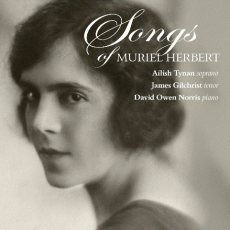Songs of Muriel Herbert - The Observer
Your heart doesn't necessarily leap when a scholar announces the discovery of four dozen baroque flute sonatas by someone with a name like Vaporetto. Legions of neglected composers await rediscovery. But on rare occasions, the "lost" talent is real, the pleasure of stumbling across a new body of work exciting and lasting.
This is so with Muriel Herbert (1897-1984), brought back to life in this collection of her art songs and performed here by a superb trio of musicians. Their commitment alone endorses the music's quality. Herbert studied music in an era when professional women composers were rare as woodlarks, yet every genteel young woman was expected to play and sing. Born in Sheffield to a musical family, she grew up, in straitened circumstances, in Liverpool, winning a scholarship to the Royal College of Music during the First World War.
There she met the great composers of the day - Charles Stanford and the homosexual Roger Quilter, with whom, to no avail, she fell in love. Preferring to work on a small scale, she started writing the elegant songs which would become her main preoccupations. She had some early success. After the war, she lived a bohemian existence, associating with James Joyce and WB Yeats, composing, teaching at a girls' school and singing. But a bad marriage and a pram in the hallway put paid to the bigger career she might have enjoyed.
Now her daughter, writer Claire Tomalin, has gathered a collection of her mother's often melancholy songs. She chose texts from a cross-section of poets: AE Housman's "Loveliest of Trees, the Cherry Now", Hardy's "Faint Heart in a Railway Carriage" (here retitled "Faint Heart in a Railway Train") and Yeats's "The Lake Isle of Innisfree".
Piano accompaniments are poignant and skilfully played by David Owen Norris. Ailish Tynan and James Gilchrist sing with open-hearted commitment. I hope the pair incorporate many of these works into their recitals. Steeped in the English song tradition of the early 20th century, they grow on you with each listening.

